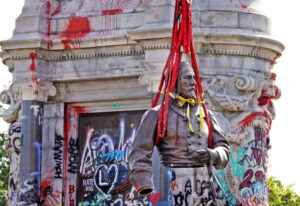Aeschylus’s tragedy Agamemnon begins with the fall of Troy. Clytemnestra, wife of the Greek king, hears news of victory, and imagines the “clash of cries” in the captured city, as the victors and the vanquished mingle. Musing on the destruction, exhaustion and still-fresh memory of violence, she hopes the occupying soldiers will withhold from looting the vanquished and angering their gods: “O, let there be no fresh wrong done!”
And yet fresh wrong will be done. It just won’t be between the Greeks and Trojans, but among the cohorts of the victors. As she pictures the sacking of Troy, Clytemnestra is already plotting to murder her husband.
Something of the same uneasy mood of post-conflict hostility, and lurking internecine violence, pervades a bracing new polemic from America’s leading conservative activist: Chris Rufo. America’s Cultural Revolution is an unapologetically uncharitable and partisan but comprehensive explanation of how we got to today’s bitter culture war. It describes the modern history of Left-wing radicalism, from the Sixties to Black Lives Matter, and the ongoing institutionalisation of this ideology via education and DEI bureaucracy.
On the face of it, it is an accessible introduction, for conservative lay readers, to key figures and ideas on the radical Left. Everyone has an opinion on this movement’s culture war and perhaps Rufo’s most impressive achievement is economy in tackling the topic.
We learn about Black Power activist Angela Davis’s suspected complicity in a violent jailbreak, alongside her advocacy of violent revolution and later of a subtler institutional kind. The Brazilian Marxist Paulo Freire is presented as a bearded sage who inflicted untold ignorance on post-revolutionary Angola, before finally entrenching his “pedagogy of the oppressed” in American schools, only harming the disadvantaged children he sought to liberate. And Derrick Bell, the father of critical race theory, is presented as a mediocre, insecure man who sank ever deeper into racialised paranoia following his early, affirmative-action-driven promotion to undeserved prominence at Harvard — and in doing so, birthed a new field of legal theory that now threatens to demolish the principle of equality before the law.
In other words: this story begins after the fall of Troy. The invaders are inside the walls, burning and looting, and the book is a retrospective account of the siege. Rufo states that he wants to expand beyond the polemical register of activism, to offer a more expansive account of the political challenge as he sees it: ideological and institutional capture by Left-wing radicalism. The word “coup” recurs frequently. The arc of the book describes how the hated victors smuggled themselves into America’s institutions, hidden in the wooden horse of civil rights, only to erupt and attempt to destroy the founding ideals that granted them entrance.
Rufo denounces the resulting university-driven “revolution from above” as one of “relentless negation” that has “gnawed, chewed, smashed, and disintegrated the entire system of values that came before it”. And all for nothing, as Rufo sees it: the utopians have “failed to deliver the world beyond”. Nor have they even succeeded in abolishing class rule, but “simply replaced the management” even as they extended “state-social bureaucracy”.
Worse still, a political programme based on “negation” can offer no positive programme that won’t swiftly fall victim to its own politics of critique. The result, Rufo argues, has not been utopia but a harvest of “failure, exhaustion, resentment, and despair”: a proliferating class of peevish bureaucrats bickering about symbols and ephemera, whose relationship to the institutions they have captured is “purely parasitical”. For such ideologues, even temporarily effective alliances regularly dissolve into “internal purges, leadership struggles, and conflict with ostensible allies”.
As a denunciation of the New Left’s moral turpitude and nihilistic moral vacuum, conservative readers will love it. The book shot to Amazon’s number one slot upon publication, suggesting there’s no shortage of appetite for such polemic. But the treatment of New Left theories of power and knowledge is much more interestingly ambivalent than the outrage-quotes would suggest.
We see our first glimpse of this early on, as Rufo explicitly situates himself in the story. A few pages in, he describes the harassment of his family by Left-wing activists in Seattle, saying: “It radicalised me.” It’s a strikingly postmodern acknowledgement of authorial positionality, placed upfront in text that’s ostensibly a critique of postmodern ideologies. Likewise, Rufo’s prognosis for where we go from here owes more than a little to the material analysis typical of classical Marxists. The “revolution from above” is so far incapable of governing for the common good, he argues, that eventually deteriorating material conditions will become impossible to ignore, however hard the bureaucrats work to suppress wrongthink. The average citizen “will be able to feel the truth intuitively”. With a confidence in historical inevitability that might have come straight from Lenin, he declares: “This realisation cannot be stopped.”
What happens then? Here, again, the book tips its hat to the revolutionaries. Rufo calls for a “counter-revolution” — and a glance at his activist track record suggests an approach to movement-building that owes much to the Marxist-Leninist theory of vanguardism. According to this doctrine, the most politically “advanced” revolutionaries should form elite organisations to advance their cause, as this will help galvanise the masses. Such vanguardism is both effective and increasingly popular among conservatives, as seen in the growing corpus of aggrieved progressive articles, criticising Rufo-affiliated activism for employing the classic Left-wing mix of grassroots volunteers and centralised, professional activists.
Throughout, the book evinces this double relationship to the political playbooks and epistemological judo of classical leftism, and of its postmodern progeny: the politics of language and power. Even as the story presents these strategies as evidence of his enemies’ wickedness, he is also reminding readers that conservatives must challenge New Left entryism on its own ground: “Revolution against revolution, institution against institution, negation against negation.”
This isn’t a criticism. Based on Rufo’s track record, there’s a strong case for counter-revolutionary vanguardism. And America’s Cultural Revolution rejects any suggestion that this means everyone is as bad as each other. Rather, Rufo draws a sharp contrast between the “politics of negation” and his movement’s underlying values. The counter-revolution, he argues, “must work as a positive force”.
To this end, he proposes smashing progressive bureaucracies and revolting against utopias in the name of “natural right, the Constitution, and the dignity of the individual”. The aim should be restoring “the revolution of 1776” over that of 1968, and reinstating the ideals of the common man, such as “family, faith, work, community, country”, along with “excellence over diversity, equality over equity, dignity over inclusion, order over chaos”.
To achieve this, Rufo implies, conservatives should not renounce but embrace the politics of power, and of knowledge, that have proven so effective in the hands of the New Left. This means adopting “a new political vocabulary” that can cut through propagandistic formulations skewed to the enemy’s priors, along with policies that will “permanently sever the connection between the critical ideologies and administrative power”. Consider the New College of Florida, where Rufo’s appointment as trustee by Republican Governor Ron DeSantis has prompted loud progressive lamentations, as he’s presided over a purge of DEI bureaucracies and policies, gutting a central New Left power-base and means of exerting institutional control.
But if this is the means, what will the end look like? While Rufo’s project is conservative-coded, it’s hard to avoid the inference that, by the time the counter-revolution happens, if it happens at all, the old world where everyone at least sort-of believed in neutral institutions and equality before the law will be long forgotten.
Regardless, America’s Cultural Revolution reads like a pivot point in American political discourse. I would have liked a glimmer or two of reflection on why leftist ideas gained such traction; Rufo’s facility for material analysis would surely stretch to this, and the findings need not be in his opponents’ favour. Ultimately, though, reflection is not what the book is for. Rather, it’s a multifaceted political intervention. For while those who enjoy culture war content may enjoy it simply as partisan red meat, its accessibility means those on the Right still bewildered by how they came to be so dispossessed no longer have an excuse for ignorance. And those conservatives with a serious interest in how knowledge and power operate in post-liberal politics can read it as an instruction manual.
Members of the Old Left, meanwhile, can mourn the theft of their movement by bourgeois nihilists, who commandeered the institutions of power in their name and are now retooling them into a shamelessly partisan bureaucracy of weaponised prejudice. As for those nihilists, should any take the time to read it, America’s Cultural Revolution is a shot across the bows. It declares, first and centrally, that the politics of negation will devour itself through negation. Troy may be sacked, but Clytemnestra waits at home, with a smile on her face and a dagger in her belt.
And it declares, further, that conservatives (or some of them, anyway) have belatedly grasped the new rules of engagement and are mobilising in turn. The citadel may have fallen, the temples looted. But in America’s Cultural Revolution, Rufo declares to the victorious New Left: we are the besiegers now. It’s your turn to try to hold the walls.
Disclaimer
Some of the posts we share are controversial and we do not necessarily agree with them in the whole extend. Sometimes we agree with the content or part of it but we do not agree with the narration or language. Nevertheless we find them somehow interesting, valuable and/or informative or we share them, because we strongly believe in freedom of speech, free press and journalism. We strongly encourage you to have a critical approach to all the content, do your own research and analysis to build your own opinion.
We would be glad to have your feedback.
Source: UnHerd Read the original article here: https://unherd.com/





